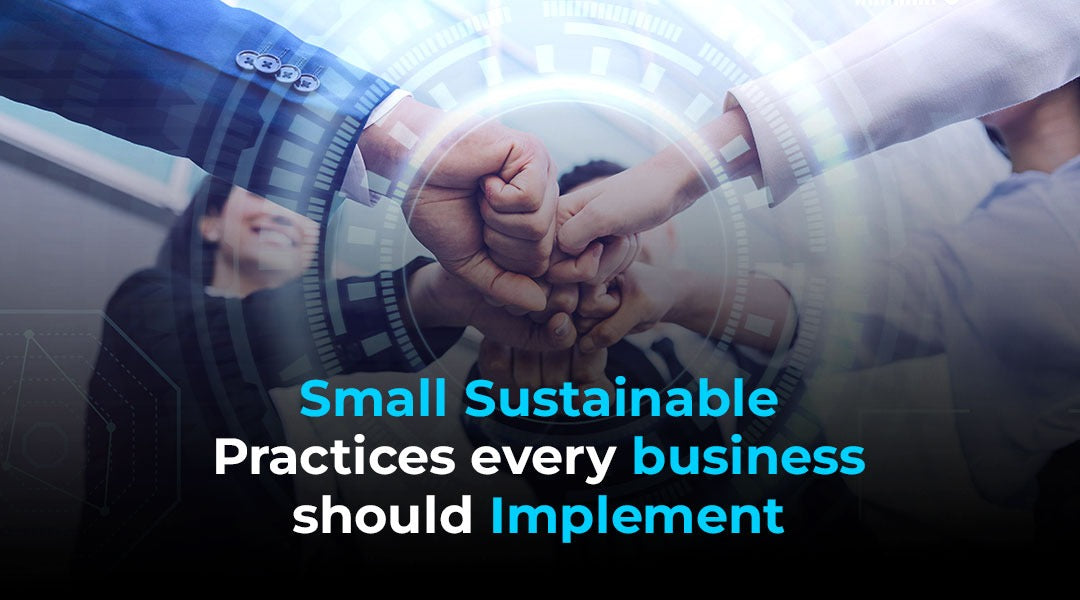
Small Sustainable Practices every business should Implement
In recent years, the concept of sustainability has gained significant attention and importance across various sectors of society. As the world faces pressing environmental challenges and limited resources, adopting sustainable practices has become crucial for the well-being of our planet and future generations. Sustainable practices encompass a broad range of actions and strategies aimed at minimizing our impact on the environment, promoting social equity, and ensuring long-term economic viability. Following is a list of few steps that businesses can implement in their operation to make a positive impact on the environment.
Biodegradable Packaging
Biodegradable packaging offers businesses an eco-friendly alternative to traditional packaging materials. Made from natural, organic substances that can break down into harmless components, biodegradable packaging reduces environmental impact, promotes sustainability, and aligns with consumer demands for greener products, fostering a positive brand image and reduces the carbon footprint as the packaging industry requires heavy use of plastic.

Donation/Recycle Used Office Equipment
Donation and recycling of office equipment provide sustainable solutions for disposing of unused or outdated items. Donating functional equipment to charities or non-profit organizations helps extend their lifespan, while recycling ensures proper disposal of electronic waste, minimizing environmental impact and promoting the circular economy.

Invest In Green Projects
Implement digital document management systems, encourage electronic communication, and reduce paper usage through online collaboration tools. You can also Implement a comprehensive recycling program and encourage employees to reduce paper usage, recycle properly, and minimize waste generation. Energy-Efficient Lighting means Upgrading to LED lighting or installing motion sensors to reduce energy consumption and increase efficiency.
Water Conservation: Install low-flow faucets and toilets, fix leaks promptly, and educate employees on water-saving practices
Virtualization and Cloud Computing
Embrace virtualization technologies and cloud computing services to reduce the need for physical servers and optimize energy consumption in data centers. These technologies enable businesses to optimize resource utilization, reduce hardware requirements, and enhance scalability. By consolidating multiple virtualized servers onto a single physical machine or utilizing cloud infrastructure, organizations can improve efficiency, flexibility, and cost-effectiveness and all in all move to using the resources we have more mindfully.
Green Supply Chain
A green supply chain refers to the integration of environmentally sustainable practices throughout the entire supply chain process, from sourcing raw materials to the end delivery of products or services. The aim is to minimize the environmental impact, conserve resources, and reduce carbon emissions associated with the supply chain operations. Collaborate with suppliers who prioritize sustainability and consider factors like carbon emissions and environmental impact. Opting for local suppliers to minimize transportation emissions and select products with minimal packaging or eco-friendly materials.
Telecommuting and Remote Work: Promote telecommuting or remote work options for employees to reduce commuting-related carbon emissions. Encourage the use of video conferencing and online collaboration tools to minimize the need for travel.
E-waste management
Right to Repair has gained massive traction in recent years. The accessibility automatically makes this perfect for companies practicing sustainability. The right to repair movement aims to promote sustainability, reduce electronic waste, and empower consumers by giving them greater control over their devices. Offices can access information, tools, and parts necessary to repair their own electronic devices or have them repaired by independent repair providers. It advocates for manufacturers to make repair manuals, diagnostic tools, and spare parts available to consumers, rather than limiting repairs to authorized service centre’s or disposing them off. Using a smart business card like Taponn’s makes a significant change as it reduces the amount of paper waste, it is a one time investment that saves countless trees.

Small changes that can be implemented in your office to make the transition to a sustainable future
- Sustainability is an ongoing effort, and engaging employees in the process can foster a culture of sustainability in the office. Regularly assess and monitor the impact of these changes and seek opportunities for continuous improvement. One way is by creating Recycling Stations. Set up clearly labelled recycling stations throughout the office for paper, plastic, glass, and other recyclable materials. Educate employees on proper recycling practices.
- Sustainable Cleaning: Switch to environmentally friendly cleaning products that are non-toxic and biodegradable. Use microfiber cloths instead of disposable wipes.
- Transportation Incentives: Offer incentives for employees who use public transportation, carpool, or bike to work, such as subsidized transit passes or preferred parking for car-poolers.
- Green Team: Establish a Green Team or sustainability committee in the office to promote and implement sustainability initiatives. Encourage employee involvement and idea sharing.
- Use of ceramic cups instead of paper cups helps reduce waste.
- Brightness levels: most of us keep brightness that is higher for the ease of working but keeping your brightness lower results in lesser charges and in turn reducing the energy consumption which helps in reducing the use of electricity.
Conclusion
By embracing sustainable practices, individuals, businesses, communities, and governments can make positive contributions towards mitigating climate change, conserving natural resources, and fostering social inclusivity. At its core, sustainability seeks to strike a balance between meeting present needs without compromising the ability of future generations to meet their own needs. It recognizes that our current patterns of production and consumption are not sustainable in the long run and that alternative approaches are required. Embracing sustainable business practices is no longer just a choice; it has become a necessity in today's world. By integrating sustainability into their operations, businesses can not only reduce their carbon footprint but also gain a competitive edge. As we move forward, it is crucial for businesses to recognize their role as agents of positive change and to take concrete steps towards integrating sustainable practices into their core operations by taking even small steps like replacing paper business card that generate so much waste and take years to decompose by a smart card like Taponn’s journey to change will be much easier. By doing so, they can contribute to a more sustainable and equitable future for both the planet and its inhabitants, while also reaping the benefits of long-term success and resilience.



